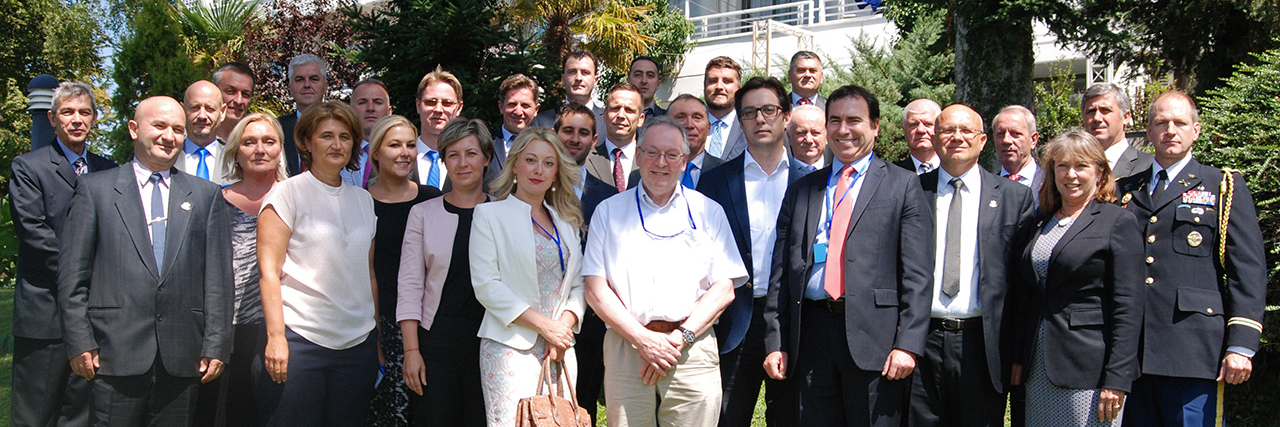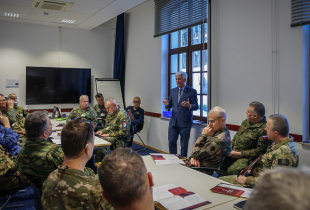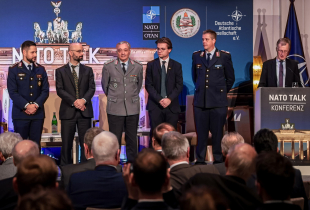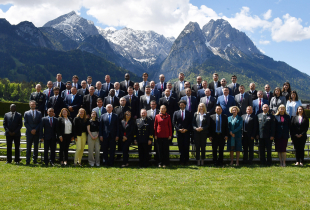
Marshall Center Macedonia Alumni Work toward NATO Accession
By Christine June
Public Affairs Office
George C. Marshall European Center for Security Studies
GARMISCH-PARTENKIRCHEN, Gemany (Sept. 5, 2017) – Macedonia’s efforts to join NATO was the focus of a continuing series of alumni workshops with the most recent held in Skopje, Aug. 30.
The Skopje workshop, was organized by the George C. Marshall European Center for Security Studies’ Macedonia Alumni Association, in cooperation with the NATO Defense College, Macedonia Ministry of Foreign Affairs, Institute for Geostrategic Research and Foreign Policy and the Marshall Center Alumni Programs office.
Opening this year’s workshop was US Ambassador to Macedonia Jess Bailey, Macedonia Foreign Minister Nikola Dimitrov, German Ambassador Thomas Norbert Gerberich, and Director of the Institute for Geostrategic Research and Foreign Policy in Macedonia’s Ministry of Foreign Affairs, Ambassador Abdulkadar Memedi.
Ambassador Bailey addressed the upcoming democratic reforms in Macedonia, especially in the rule of law and personal freedoms, stressing that Macedonia has the full support of the United States for the efforts in this process.
“Obviously, there have been significant political changes in Macedonia, the region and the United States since last August, when I spoke at the Marshall Center Alumni conference about the Warsaw Summit. Three things have not changed. First, NATO remains the core of transatlantic security, important as ever, and resilient as ever as it meets new challenges, including terrorism, cyber and hybrid warfare, and asymmetric conflicts around its periphery. Second, Allies and partners remain committed to NATO and indeed are increasing their investments in collective defense and deterrence. The third thing that has not changed is Macedonia’s strategic goal of joining NATO, and the U.S. commitment to work with Macedonia to achieve this,” said Bailey.
German Ambassador Gerberich emphasized the Federal Republic of Germany will continue to support Macedonia in the Euro-Atlantic integration process, which is of interest to all countries in the region.
"Such a profound reform process requires a lot of strength and courage. We must offer greater recognition, as "Macedonian" society, like many others in the Western Balkans region, is in the midst of a major reconstruction process; from an economic, political and social point of view. We must understand that these reforms are difficult. These do not serve NATO, but it is in the interests of the Western Balkans themselves. As NATO members, we need to take concrete steps and develop fresh ideas for implementing the process of integration of the Western Balkan countries. Accession to NATO and the EU is the best way to stabilize it,” Gerberich was reported to have said.
During the workshop, Marshall Center alumni addressed topics and issues related to the NATO accession process, the reforms necessary for meeting the criteria for membership and the efforts of the new Macedonian government to unblocking the Euro-Atlantic integration process. A treaty of good neighborly relations with the Republic of Bulgaria was signed and a new, positive approach to improve relations with Greece was discussed.
This was the second alumni event hosted in Macedonia this year. A three-day conference in Lake Ohrid was held Aug. 26-29, and focused on NATO and EU cooperation in projecting stability for the western Balkans. Other events have been held the past few years.


